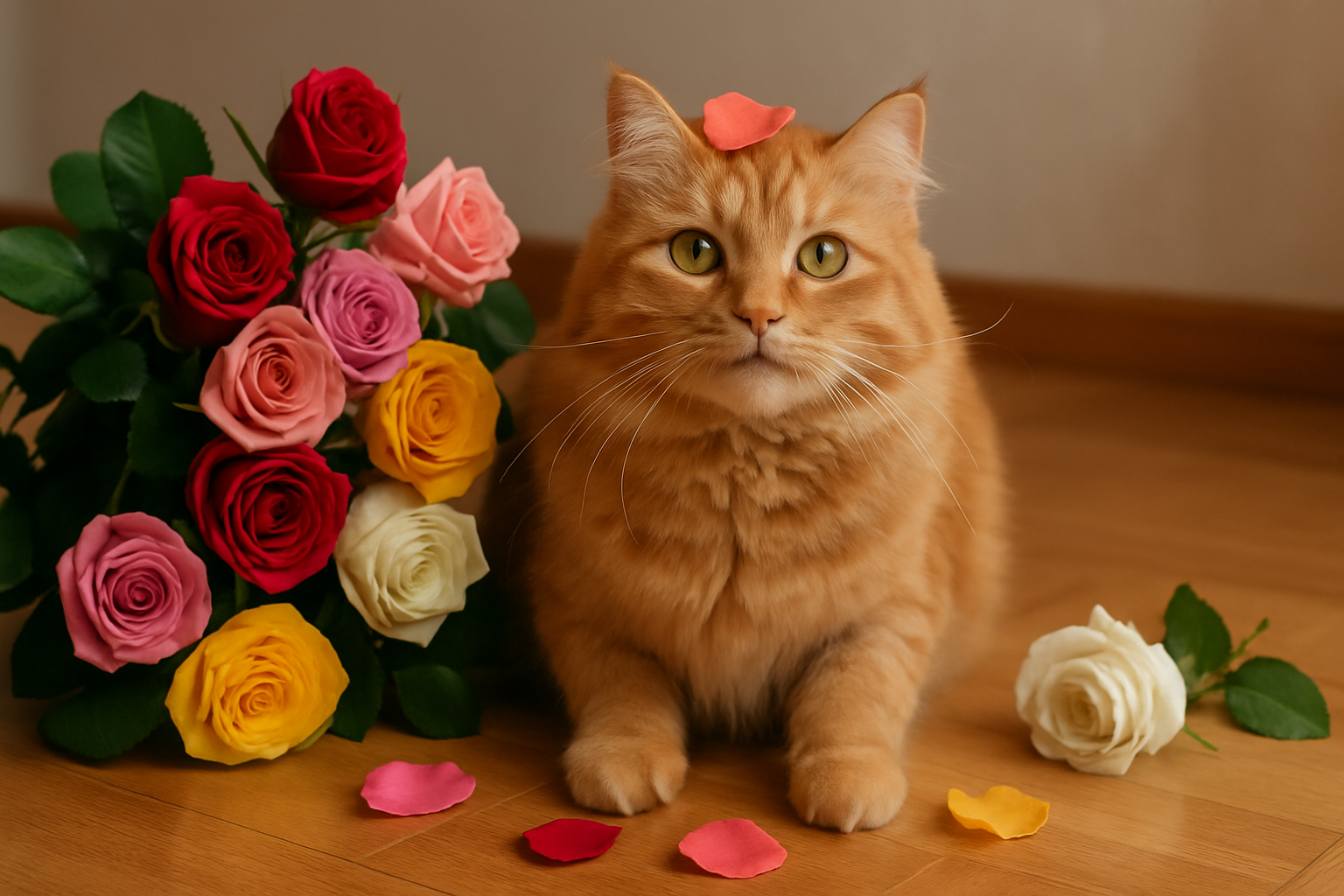If you’ve ever caught your cat nibbling on a bouquet of roses, you’re not alone. Whether it’s the petals, the leaves, or just the irresistible crinkle of wrapping paper, cats seem oddly drawn to flowers — especially roses. But are roses actually toxic to cats?
The good news: most roses (Rosa spp.) are considered non-toxic to cats. The not-so-good news? That doesn’t mean they’re completely harmless. From thorn injuries to stomach upset to pesticide exposure, there are a few hidden dangers cat parents should be aware of.
Are Rose Petals, Leaves, or Stems Toxic to Cats?
The actual plant material of standard garden or florist roses — including petals, leaves, and stems — is not considered poisonous to cats according to the ASPCA’s list of toxic plants. However, if ingested, they can still cause mild irritation or digestive upset. That’s especially true for curious kitties who like to chew on leaves or stems.
Some cats may experience:
- Mild vomiting or diarrhea
- Drooling or pawing at the mouth
- Decreased appetite
- Lethargy (rare but possible with larger ingestions)
Sharp rose thorns can also cause mouth injuries, eye scratches, or paw punctures — particularly in playful kittens.
What About Spray Roses, Mini Roses, and Rose Varieties?
Most cultivated rose varieties — including spray roses, mini roses, white roses, pink roses, and yellow roses — fall under the same “non-toxic but potentially irritating” category. The risk lies less in the rose itself and more in what’s been applied to it.
Florist roses and store-bought bouquets are often treated with floral preservatives, essential oils, dyes, or pesticide sprays. These substances can be toxic to cats if licked off or chewed.
Are Dried Roses or Rose Petals Safe for Cats?
While dried roses might seem harmless, they can still pose risks. The petals become brittle and break into sharp fragments — which may irritate the mouth or digestive tract. Some cats also show a strong interest in potpourri or scented sachets, which often include rose oil, fragrance additives, or essential oils that are toxic to felines.
If you use dried flowers in your home, keep them out of reach or consider using cat-safe alternatives like unscented dried wheatgrass or oat grass as a decorative (and edible) option.
Hidden Dangers: Fertilizers, Pesticides, and Rose Water
Here’s where the real danger comes in — not the rose itself, but what’s on the rose.
- Pesticide residue from garden roses can lead to poisoning if ingested or absorbed through the skin.
- Fertilizers used around rose bushes may contain bone meal, blood meal, or chemical additives harmful to pets.
- Rose water, rose oil, or rose-scented sprays can contain compounds like geraniol or phenols — known irritants to cats.
If your cat comes into contact with any treated rose product, rinse the affected area gently and call your vet. In some cases, activated charcoal or supportive care may be needed.
What to Do If Your Cat Eats a Rose
Don’t panic. In most cases, a cat nibbling a rose will only experience minor symptoms, if any. Here’s what to do:
- Remove access to the roses immediately.
- Check your cat’s mouth and paws for thorns or cuts.
- Monitor for signs of distress: vomiting, drooling, diarrhea, lethargy, or pawing at the mouth.
- Call your vet if symptoms persist beyond a few hours or worsen.
For emergencies, contact the ASPCA Animal Poison Control Center or the Pet Poison Helpline.
How to Keep Your Cat Safe Around Roses
If you love decorating with roses, but your cat loves snacking on them, here are a few tips to keep peace in the house:
- Keep roses in rooms your cat can’t access
- Place cut flowers in high, stable vases well out of reach
- Avoid using essential oils or floral sprays
- Choose organic roses grown without pesticides
- Provide safe, edible plants like cat grass or silvervine nearby
Safe Alternatives to Roses for Cat Households
Looking for pet-friendly flowers that are beautiful and safe for your curious kitty? Try these:
- Snapdragons
- Marigolds (in moderation)
- Asters
- Gerbera daisies
- Orchids
Always double-check plant safety using the ASPCA’s searchable database before bringing any new flora into your home.
FAQs About Cats and Roses
Are roses poisonous to cats?
No, roses are not considered poisonous to cats. However, they can still cause stomach upset or mouth irritation if ingested, especially if thorns or chemicals are involved.
Can rose thorns hurt my cat?
Yes, thorns can cause painful cuts or puncture wounds to the mouth, paws, or eyes. Always trim thorny stems if you bring roses indoors.
Are dried roses safe for cats?
Dried rose petals are not toxic, but they can be a choking hazard or cause digestive discomfort. Avoid leaving dried bouquets where cats can access them.
What about rose-scented oils or candles?
Many rose-scented products contain essential oils that are unsafe for cats. Avoid using diffusers or candles near your cat’s favorite napping spots.
Is it safe to grow roses in a cat-friendly garden?
Yes — if you skip pesticides, avoid thorny low bushes, and provide safe enrichment like catnip or oat grass nearby.
Final Thoughts: Can Cats Be Around Roses Safely?
Roses aren’t deadly to cats — but they’re not totally safe either. While the petals and leaves are non-toxic, potential hazards like thorns, pesticides, and oils still make them worth keeping out of paw’s reach.
With a little precaution, you can enjoy your favorite blooms and keep your curious kitty safe and happy. A rose by any other name may smell just as sweet — but not if it gives your cat a bellyache.







